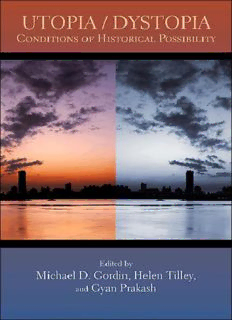
Utopia/dystopia : conditions of historical possibility PDF
Preview Utopia/dystopia : conditions of historical possibility
Utopia/Dystopia Publication in partnership with the Shelby Cullom Davis Center at Princeton University Other Books in the Series The Spaces of the Modern City: Imaginaries, Politics, and Everyday Life, edited by Kevin Kruse and Gyan Prakash Noir Urbanisms: Dystopic Images of the Modern City, edited by Gyan Prakash U topia/Dystopia CONDITIONS OF HISTORICAL POSSIBILITY Michael D. Gordin, Helen Tilley, and Gyan Prakash, Editors Princeton University Press ■ Princeton and Oxford Copyright © 2010 by Princeton University Press Published by Princeton University Press, 41 William Street, Princeton, New Jersey 08540 In the United Kingdom: Princeton University Press, 6 Oxford Street, Woodstock, Oxfordshire OX20 1TW press.princeton.edu All Rights Reserved Library of Congress Cataloging-in-Publication Data Utopia/dystopia : conditions of historical possibility / Michael D. Gordin, Helen Tilley, and Gyan Prakash, editors. p. cm. Includes bibliographical references and index. ISBN 978-0-691-14697-3 (hbk. : alk. paper)—ISBN 978-0-691-14698-0 (pbk. : alk. paper) 1. Utopias—History. 2. Dystopias—History. I. Gordin, Michael D. II. Tilley, Helen, 1968– III. Prakash, Gyan, 1952– HX806.U777 2010 335(cid:2).02—dc22 2010010267 British Library Cataloging- in- Publication Data is available This book has been composed in Electra Book designed by Marcella Engel Roberts Printed on acid-f ree paper (cid:3) Printed in the United States of America 10 9 8 7 6 5 4 3 2 1 Contents Introduction: Utopia and Dystopia beyond Space and Time 1 PART ONE anima 1. Fredric Jameson Utopia as Method, or the Uses of the Future 21 2. Jennifer Wenzel Literacy and Futurity: Millennial Dreaming on the Nineteenth- Century Southern African Frontier 45 3. Dipesh Chakrabarty Bourgeois Categories Made Global: The Utopian and Actual Lives of Historical Documents in India 73 4. Luise White The Utopia of Working Phones: Rhodesian Independence and the Place of Race in Decolonization 94 5. Timothy Mitchell Hydrocarbon Utopia 117 PART TWO artifi ce 6. John Krige Techno- Utopian Dreams, Techno- Political Realities: The Education of Desire for the Peaceful Atom 151 7. Marci Shore On Cosmopolitanism, the Avant- Garde, and a Lost Innocence of Central Europe 176 8. David Pinder The Breath of the Possible: Everyday Utopianism and the Street in Modernist Urbanism 203 vi CONTENTS 9. Igal Halfi n Stalinist Confessions in an Age of Terror: Messianic Times at the Leningrad Communist Universities 231 10. Aditya Nigam The Heterotopias of Dalit Politics: Becoming- Subject and the Consumption Utopia 250 List of Contributors 277 Index 281 Utopia/Dystopia Introduction Michael D. Gordin, Helen Tilley, and Gyan Prakash Utopia and Dystopia beyond Space and Time Utopias and dystopias are histories of the present. Even before we begin to explain that sentence, some readers may feel a nagging concern, for the very term “utopia” often sounds a little shopworn. It carries with it the trappings of an elaborate thought experiment, a kind of parlor game for intellectuals who set themselves the task of designing a future society, a perfect society—following the pun on the name in Greek (no place, good place: imaginary yet positive). Projecting a better world into the future renders present- day problems more clearly. Because utopias tend to be the products of scholars and bookworms, it is not surprising that from the time of the concept’s (or at least the term’s) formal birth in the Renaissance, it has attracted quite a bit of academic atten- tion. Much of this history is easily accessible, even second nature, to intellec- tual historians, and it traces the genealogy of ideal, planned societies as envis- aged from Plato to science fi ction. The appeal and the resonances are obvious and rather powerful: religious roots in paradise, political roots in socialism, economic roots in communes, and so on. Ever since Thomas More estab- lished the literary genre of utopia in his 1516 work of that title, much of histo- rians’ writing on the relevance of utopia has focused on disembodied intel- lectual traditions, interrogating utopia as term, concept, and genre.1 Dystopia, utopia’s twentieth- century doppelgänger, also has diffi culty es- caping its literary fetters. Much like utopia, dystopia has found fruitful ground to blossom in the copious expanses of science fi ction, but it has also fl ourished in political fi ction (and especially in anti- Soviet fi ction), as demonstrated by the ease with which the term is applied to George Orwell’s 1984, Evgenii Zamiatin’s We, and Aldous Huxley’s Brave New World.2 Despite the name, dystopia is not simply the opposite of utopia. A true opposite of utopia would be a society that is either completely unplanned or is planned to be deliber- ately terrifying and awful. Dystopia, typically invoked, is neither of these things; rather, it is a utopia that has gone wrong, or a utopia that functions only for a particular segment of society. In a sense, despite their relatively recent literary and cinematic invention, dystopias resemble the actual societies histo- rians encounter in their research: planned, but not planned all that well or
Description: